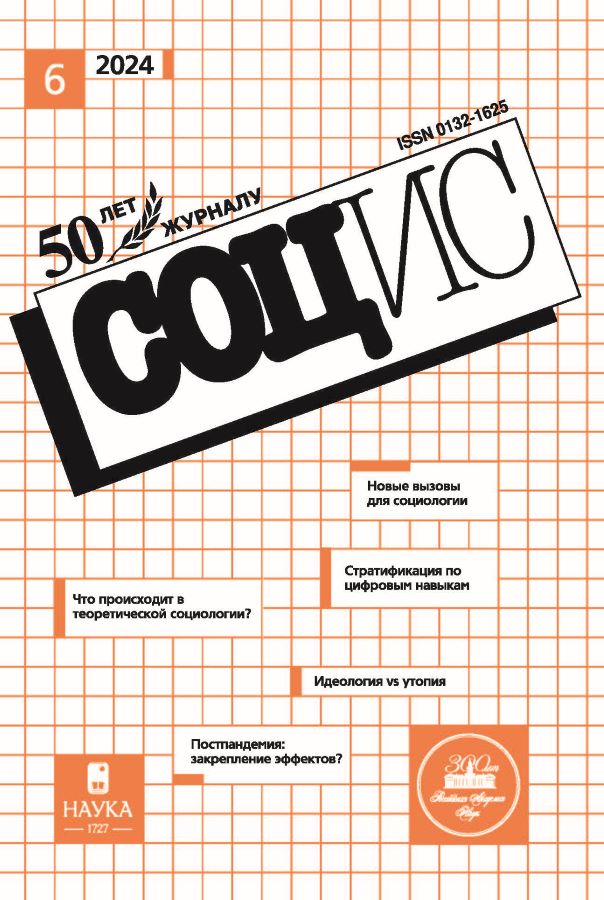Crisis and stabilization dynamics of mass consciousness in Russian society
- 作者: Savin S.D.1,2
-
隶属关系:
- Institute of Sociology FCTAS RAS
- RUDN
- 期: 编号 6 (2024)
- 页面: 76-87
- 栏目: SOCIAL STRUCTURE. SOCIAL POLICY
- URL: https://ruspoj.com/0132-1625/article/view/673686
- DOI: https://doi.org/10.31857/S0132162524060071
- ID: 673686
如何引用文章
详细
The article raises the question of the connection between social changes and mass consciousness dynamics. The cyclical nature of social development involves a transition through crisis-stabilisation phases reflected in varying ways in the mass consciousness’ intentions. Various types of mass consciousness are distinguished depending on the focus either on changes or conventions, development or crisis, social activity or passivity. The role of stabilisation consciousness in the context of social changes and systemic challenges is analysed. It is shown that stabilising consciousness plays a vital amortisation role during crises. The analysis of crisis and stabilisation dynamics in mass consciousness of Russian society is provided based on the materials of monitoring studies of the Institute of Sociology of the Federal Research Centre of the Russian Academy of Sciences and other Russian sociological centres. It is concluded that in Russian society for more than two decades the dominant type of mass consciousness has been stabilization consciousness, but fluctuations in its parameters either bring it closer to crisis consciousness or to development consciousness. Such frequent cycles are characteristic for a trauma society or a society with a low level of stability without any specific development trajectory.
全文:
作者简介
Sergey Savin
Institute of Sociology FCTAS RAS; RUDN
编辑信件的主要联系方式.
Email: ssd_sav@mail.ru
Cand. Sci. (Sociol.), Leading Researcher, Institute of Sociology FCTAS RAS; Assoc. Prof. of the RUDN Department of Sociology
俄罗斯联邦, Moscow参考
- Astafyev Y. U. (2023) Vladimir Shubkin as student of catastrophic consciousness. Sotsiologicheskie issledovaniya [Sociological Studies]. No. 8: 25–33. doi: 10.31857/S013216250027364-3. (In Russ.)
- Burgess A., Wardman J., Mythen G. (2018) Considering risk: placing the work of Ulrich Beck in context. Journal of risk research. Vol. 21. Nо. 1: 1–5.
- Gorshkov M. K. (1988) Public opinion: history and modernity. Moscow: Politizdat. (In Russ.)
- Grushin B. A. (1987) Collective consciousness: defining experience and research problems. Moscow: Politizdat. (In Russ.)
- Ivanova V., Shubkin V. (2005) Mass concern of Russians as an obstacle to the integration of society. Sotsiologicheskie issledovaniya [Sociological Studies]. No. 2: 22–27. (In Russ.)
- Hentrup M. (2010) Toward a Critique of Crisis Consciousness. Thesis. University of Oregon theses, Dept. of Philosophy, M.A. URL: https://scholarsbank.uoregon.edu/xmlui/handle/1794/10640?show=full (accessed 01.06.2024).
- How are you, Russia? Express information. 53rd stage of the sociological monitoring, June 2023 (2023 / Levashov V. K., Velikaya N. M., Shushpanova I. S. [et al.] – Moscow: FCTAS RAS.
- Karavay A. (2022) The Social Capital of Russian Society in the Face of External Shocks of Different Nature // Voprosy teoreticheskoy ekonomiki [Issues of Economic Theory]. No. 4: 134–148. (In Russ.)
- Katernyi I. V. (2023) Development of the theory of crisis in sociology: evolving ideas and modernity. Sotsiologicheskie issledovaniya [Sociological Studies]. No. 10: 14–26. (In Russ.)
- Kravchenko S. A. (2018) The development of non-linear knowledge: new risks, vulnerabilities, and hopes. RUDN Journal of Sociology. Vol. 18 (2): 195–207.
- Latov Yu.V. (2023) Dynamics of mass consciousness of Russians: extraordinary situation or beginning of a new cycle? POLIS. Politicheskie issledovaniya [Political Studies]. No. 6: 161–179. (In Russ.)
- Mersianova I. V., Briukhno A. S. (2023) Russian citizens’ social mood, its structure and influence on helping behaviour. Sotsiologicheskie issledovaniya [Sociological Studies]. No. 9: 29–40. (In Russ.)
- Pautova L. A. (2006) Stabilization Consciousness: An Integrative Model. Omsk: OmGTU. (In Russ.)
- Petuhov V. V. (2018) Dynamics of the social attitudes of the Russia’s citizens and making of a public demand for change. Sociologicheskie issledovaniya. [Sociological Studies]. No. 11 (415): 40–53 (In Russ.)
- Rasskazov L. D., Badmaeva M. V. (2018) Crisis consciousness of Russian society during the transition period. Vestnik Buryatskog. gosudarstvennogo universiteta [Journal of Buryat State University]. Vol.1. No. 3: 50–57. (In Russ.)
- Russian society and challenges of the time. Part six. Institute of Sociology of the FCTAS RAS (2022) // Еd. by M. K. Gorshkov, N. E. Tihonova. Moskva: Izdatel’stvo «Ves’ Mir». (In Russ.)
- Smirnova I. N. (2015) Category of crisis consciousness: theoretical concepts and measurement practices. Vestnik Ivanovskogo gosudarstvennogo universiteta [Ivanovo State University Bulletin]. No. 3. (8): 52– 58. (In Russ.)
- Sorokin P. A. (2012) Man and society in calamity: The influence of war, revolution, famine, epidemic on human intelligence and behavior, social organization and cultural life / Ed. by I. A. Fedorov. St. Petersburg: Mir. (In Russ.)
- Toschenko Zh.T., Kharchenko S. V. (1996) Social mood. Moscow, Academia. (In Russ.)
- Toshchenko Zh.T. (2020) Trauma societies and their characteristics. Gumanitarii Yuga Rossii [Humanities of the south or Russia]. Vol. 9. No.1: 30–50. (In Russ.)
- Sztompka P. Social change as trauma. Sociologicheskie issledovaniya [Sociological Studies]. No. 1: 6–16. (In Russ.)
- Uledov A. K. (1963) Public Opinion of Soviet Society. Moscow: Sotsekgiz. (In Russ.)
- Yanickiy O. N. (2017) On the Relationship Between Stability and Mobility of Global Systems. Sociologicheskaya nauka i social’naya praktika [Sociological Science and Social Practice]. Vol. 5. No. 2 (18): 30–46. (In Russ.)
补充文件












